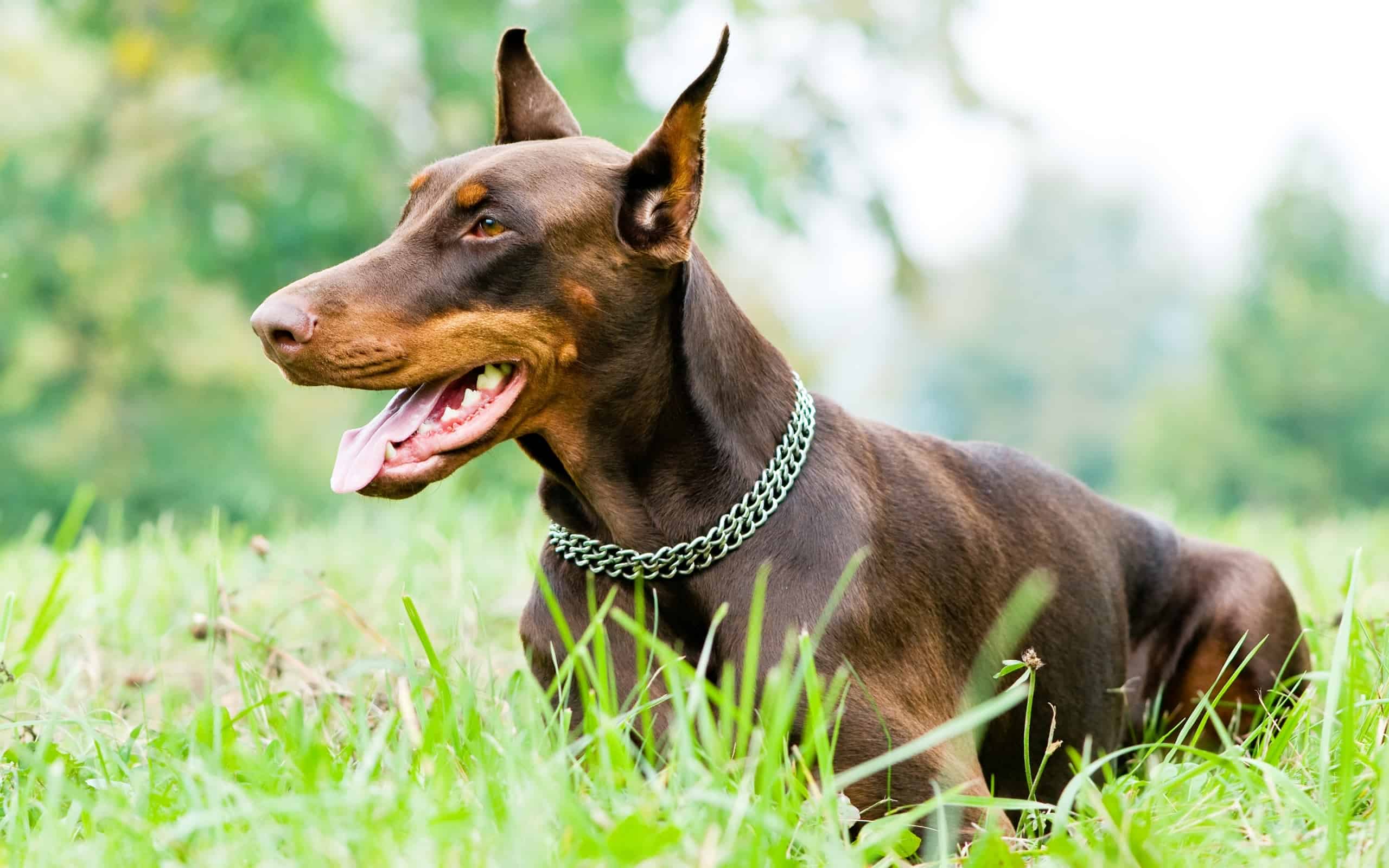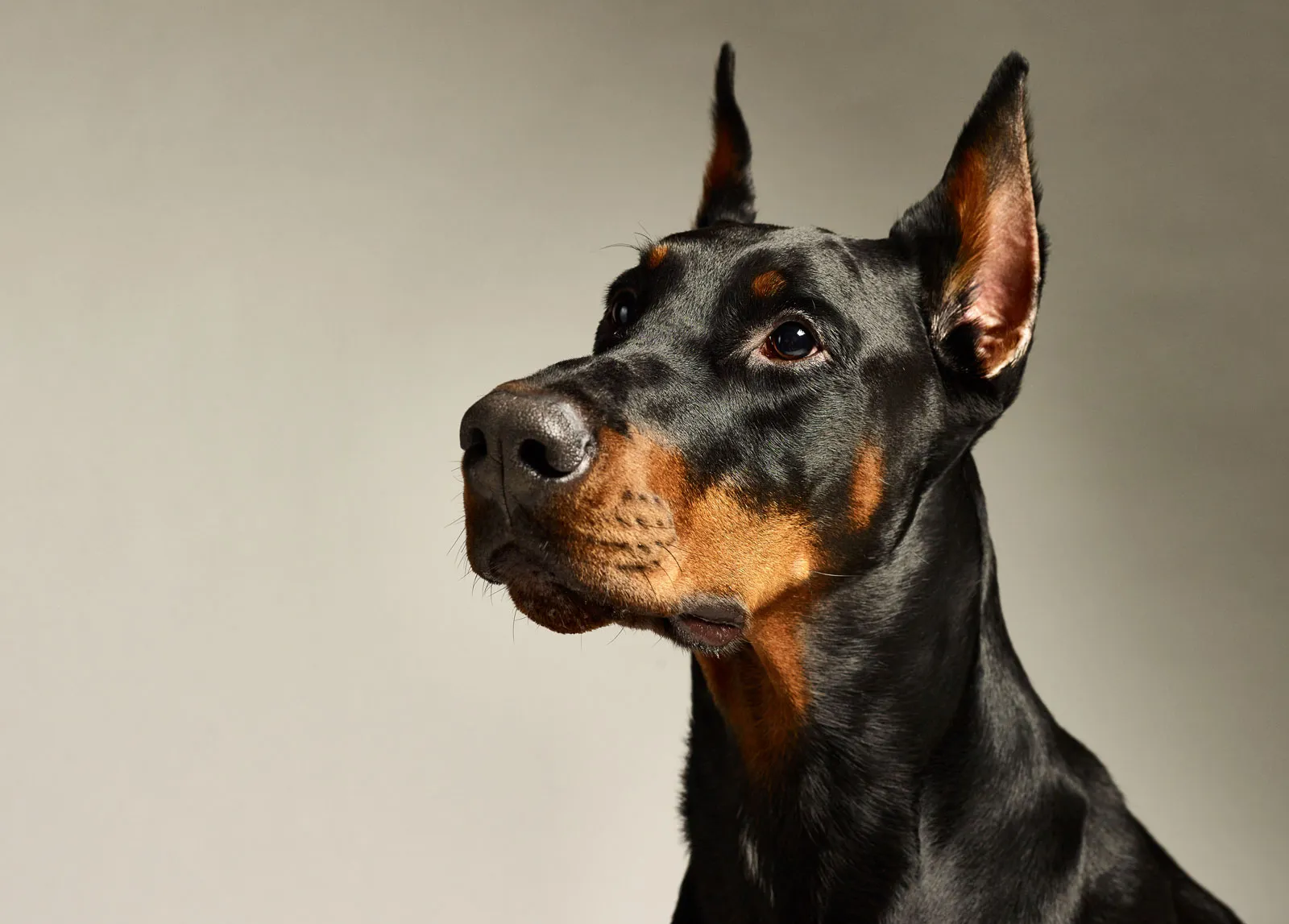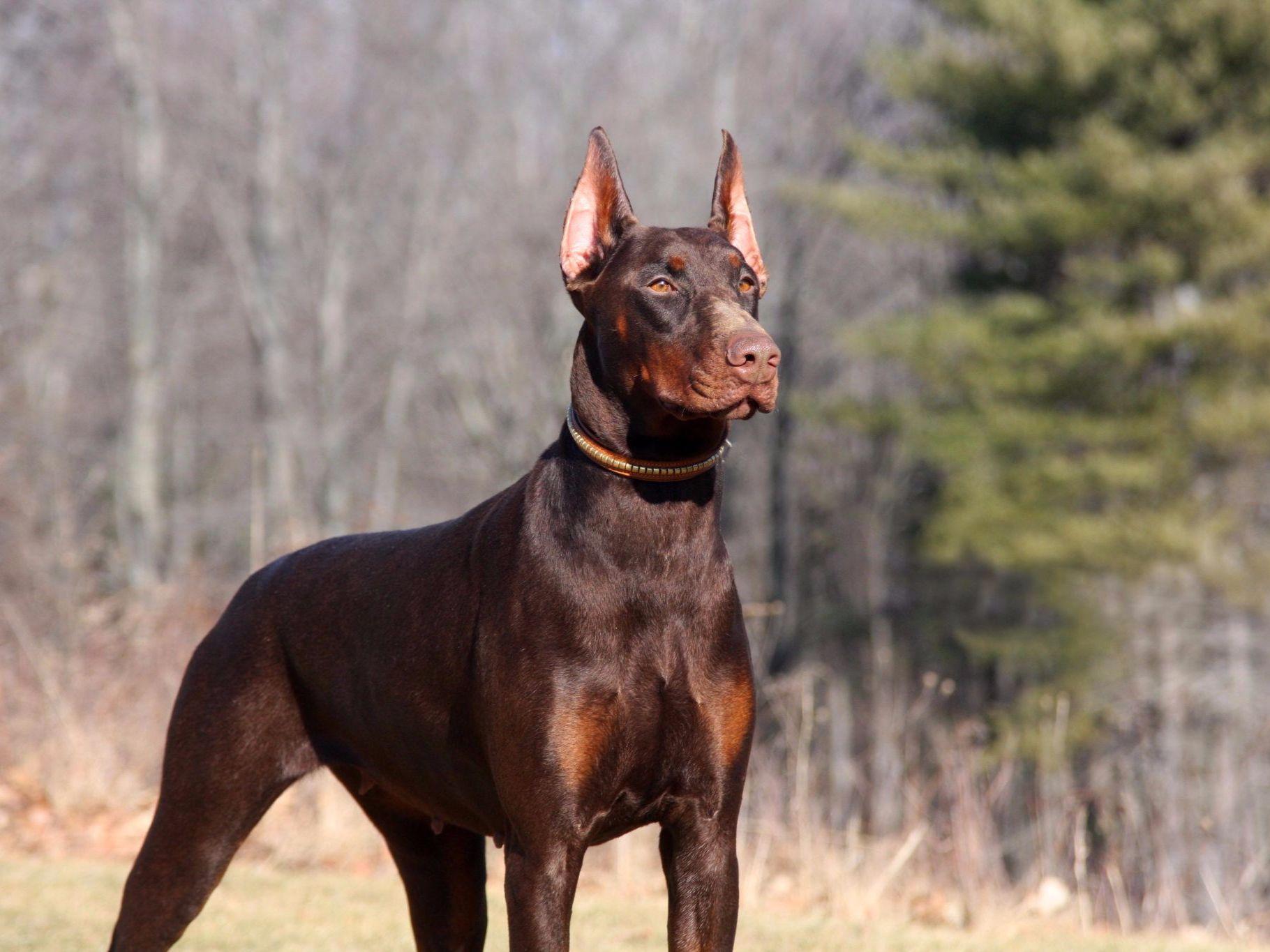When it comes to iconic dog breeds that blend grace, loyalty, and strength in perfect harmony, the Doberman Pinscher stands proudly at the forefront. With their sleek appearance, unwavering loyalty, and unmatched versatility, Dobermans have captured the hearts of dog enthusiasts around the world. From their origins as loyal protectors to their roles as loving family companions, the Doberman Pinscher's legacy is a testament to the incredible bond between humans and canines.

The Doberman Pinscher owes its name and initial breeding to a German tax collector named Karl Friedrich Louis Dobermann, who sought a loyal and protective companion for his taxing rounds in the late 19th century. He set out to create a breed that embodied the traits of courage, intelligence, and loyalty, qualities that would serve him well as he traversed unfamiliar territory.
Dobermann carefully selected and bred various dog breeds, including the Rottweiler, German Pinscher, Greyhound, and Weimaraner, to create the Doberman Pinscher we recognize today. The result of this intentional crossbreeding was a dog that possessed an imposing appearance, remarkable agility, and an unwavering devotion to its owner.
The Doberman's physical appearance is a striking blend of elegance and power. Standing tall at around 24 to 28 inches at the shoulder and weighing between 60 to 100 pounds, Dobermans have a well-muscled and streamlined body. Their coat is typically short, smooth, and comes in four primary colors: black, red, blue, and fawn, often with rust markings on the face, chest, legs, and tail.
One of the most distinctive features of the Doberman is its cropped ears and docked tail. While these practices are rooted in historical working roles, they have sparked debates among dog lovers and veterinarians regarding their ethical implications. In some countries, these practices are now banned or regulated.
Beyond their stunning appearance, Dobermans are renowned for their exceptional intelligence and unwavering loyalty. They are quick learners and thrive on mental and physical stimulation. Due to their high intelligence, they are well-suited for various roles such as police and military work, search and rescue operations, and even as therapy dogs.
Dobermans are also fiercely loyal and protective of their families. They form strong bonds with their human companions and will go to great lengths to ensure their safety. Despite their protective nature, a well-socialized and trained Doberman is generally friendly towards strangers, making them excellent family pets.
Training and socialization are crucial aspects of raising a well-mannered Doberman Pinscher. Early and consistent training helps channel their intelligence and energy in positive ways, preventing behavioral issues. Positive reinforcement methods, including treats and praise, work well with this breed, as they are eager to please their owners.
Proper socialization from an early age is essential to ensure that Dobermans grow up to be confident and well-adjusted dogs. Exposing them to various people, environments, and situations will help prevent shyness or aggression later in life.
Dobermans are an active and energetic breed that requires regular exercise to maintain their physical and mental well-being. Daily walks, playtime, and engaging activities like obedience training or agility exercises are essential to prevent boredom and destructive behavior.
Failure to provide sufficient exercise and mental stimulation can lead to behavioral issues, such as excessive barking, digging, or chewing. An ideal living situation for a Doberman includes a securely fenced yard where they can burn off energy while being supervised.
Like all dog breeds, Dobermans are prone to certain health issues that potential owners should be aware of. Dilated cardiomyopathy, a heart condition, and hip dysplasia, a joint disorder, are some of the common health concerns in Dobermans. Regular veterinary check-ups, a balanced diet, lower inbreeding and appropriate exercise can help mitigate these risks.
The Doberman Pinscher's journey from a protective tax collector's companion to a beloved family member is a testament to their versatility and enduring appeal. With their striking appearance, intelligence, loyalty, and protective nature, Dobermans have carved out a special place in the hearts of dog enthusiasts worldwide. Whether serving as devoted protectors, search and rescue heroes, or loving family companions, the Doberman Pinscher continues to captivate us with its elegance, loyalty, and strength. As responsible owners, it is our duty to honor this breed's legacy by providing them with the love, care, and training they deserve, ensuring that they thrive as both remarkable working dogs and cherished companions.
"United Pet Club," is designed to assist Doberman Pinscher owners in tracking their dogs' health information at different life stages. Owners can utilize this software throughout their pets' lives to effectively monitor and manage their health. The collected data can then be utilized to contribute to the overall enhancement of the Doberman Pinscher breed's health.
The "United Pet Club" software empowers owners to input and store crucial health details about their Doberman Pinschers, including:
Vaccination Records: Easily keep track of vaccination dates, types, and booster shots to ensure your Doberman Pinscher remains current on immunizations.
Medical History: Maintain a comprehensive record of past illnesses, surgeries, and medical treatments to establish a comprehensive health profile.
Diet and Nutrition: Log dietary preferences, feeding schedules, and any dietary restrictions or allergies to ensure optimal nutrition.
Exercise and Activity: Record daily exercise routines, activity levels, and closely monitor weight to promote a healthy lifestyle.
Regular Checkups: Set convenient reminders for routine veterinary appointments and document the outcomes of health examinations.
Medication Tracking: Effortlessly manage medications, dosages, and administration schedules for any ongoing health conditions.
Allergies: Note any known allergies, sensitivities, or reactions to specific substances for accurate management.
Behavior and Mood: Monitor changes in behavior, moods, and any unusual patterns that might signify health concerns.
Grooming and Hygiene: Keep detailed records of grooming routines, bath schedules, and hygiene practices to ensure your Doberman's overall well-being.
Through the collective health data contributed by Doberman Pinscher owners who utilize the "United Pet Club" software, you can actively participate in enhancing the breed's health. This valuable data serves to identify trends, genetic predispositions, and potential health risks within the breed. Over time, this collective dataset aids breeders, veterinarians, and researchers in making well-informed decisions to promote the health and longevity of Doberman Pinschers.
Moreover, the "United Pet Club" software offers insights and recommendations based on the data provided by owners, assisting them in making informed choices about their dogs' care and well-being.
In summary, the "United Pet Club" software provides a comprehensive solution for Doberman Pinscher owners, enabling them to proactively manage and monitor their pets' health while actively contributing to the broader objective of enhancing the breed's health through data-driven insights and advancements.

The Doberman Pinscher, known for its elegance, intelligence, and bravery, was developed in the late 19th century by Karl Friedrich Louis Dobermann, a German tax collector who needed a loyal and protective dog for his often-dangerous job. By combining breeds like the Rottweiler, German Pinscher, Greyhound, and Weimaraner, he created a versatile working dog capable of guarding, tracking, and companionship.
Over time, the Doberman evolved into a refined yet powerful breed, prized by military, police, and civilian handlers alike. It was recognized by the American Kennel Club (AKC) in 1908, and has remained a symbol of protection, intelligence, and loyalty ever since.
The Doberman is consistently ranked among the top working breeds worldwide, admired for its devotion to its family, trainability, and fearless demeanor. It’s a favorite in home protection, competitive obedience, and even therapy work, proving to be far more than just a guard dog.
The Doberman is a medium-to-large, athletic breed with a sleek, muscular frame and regal appearance.
Coat: Short, smooth, and close-fitting.
Color:
Black and rust, blue and rust, red and rust, and fawn and rust.
Size:
Height: 24–28 inches (61–71 cm)
Weight: 60–100 lbs (27–45 kg)
Head & Expression: Long, wedge-shaped head with intelligent, alert eyes.
Ears: Naturally floppy, often cropped (where legal) to stand erect.
Tail: Typically docked (where allowed), carried high and straight.
Body: Compact, powerful, and built for speed, stamina, and agility.
Dobermans are renowned for their fearless, intelligent, and deeply loyal nature.
Protective and Alert: A natural guardian that takes its role seriously.
Loyal and Devoted: Forms intense bonds with family—can be velcro dogs.
Highly Intelligent: Among the top 5 smartest dog breeds, excelling in obedience and problem-solving.
Energetic and Driven: Requires consistent physical and mental engagement.
Confident and Calm: When trained well, a Doberman is poised and dependable.

Perfect for experienced owners seeking a highly intelligent, loyal, and courageous companion.
Elite Guardian: Trusted worldwide for home and personal protection.
Trainable and Obedient: Thrives in obedience, protection, and agility sports.
Elegant Appearance: Few breeds are as striking or graceful in motion.
Versatile: Suited for work, competition, and companionship.
Devoted Family Dog: Surprisingly affectionate and gentle with its family.
Dobermans require structure, exercise, and close companionship.
Training:
Start early—obedience and socialization are crucial.
Responds exceptionally well to positive reinforcement.
Exercise:
Needs at least 1–2 hours of activity daily—running, training, or advanced sports.
Grooming:
Low-maintenance coat—brush weekly and bathe occasionally.
Keep nails trimmed and ears clean.
Nutrition:
Feed a high-quality, high-protein diet to support muscle tone and energy.
Companionship:
Not suited for isolation—needs regular engagement and family interaction.
Dobermans are generally healthy, but like all breeds, they may be prone to certain conditions:
Dilated Cardiomyopathy (DCM)
Von Willebrand’s Disease (a bleeding disorder)
Hip Dysplasia
Wobbler Syndrome (neck/spinal issue)
Hypothyroidism
Work with health-conscious breeders and maintain regular vet checkups to ensure long-term health. Average lifespan: 10–13 years.

Compared to the Rottweiler, the Doberman is more agile and elegant, with slightly less bulk. Unlike the German Shepherd, the Doberman is more direct in personality and requires firm leadership but less shedding. It’s also more affectionate and manageable in smaller living spaces than some giant guardians like the Cane Corso.
This breed is perfect for those who want a devoted protector, training partner, and companion all in one. Best suited for experienced dog owners who can offer leadership, time, and stimulation. If you're new to dogs, lead a sedentary life, or lack time for training, the Doberman may not be the right fit.
United Pet Club is here to help you explore the world of the Doberman Pinscher. From trusted breeders and rescues to training guides and health support, we’re your go-to resource for making this incredible breed part of your life.
Visit our platform to learn more about this intelligent, noble, and fearless companion.